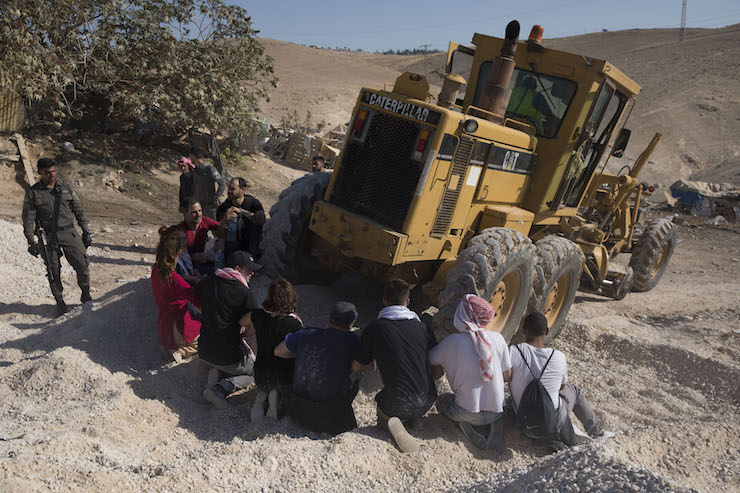A well-known human rights activist received a call warning that law enforcement will ‘take steps against him’ over any illegal ‘speech, act, or behavior’ in relation to Khan al-Ahmar. Activists are camped out in the village, hoping to stop the imminent demolition, which the ICC warned would be a war crime.
By Michael Schaeffer Omer-Man and Yael Marom

Israeli police appear to have “warned” at least one well-known Israeli human rights activist that law enforcement will “take steps” against him if he says or does anything illegal in relation to the imminent destruction and forced displacement of Khan al-Ahmar.
“You don’t have to speak with me,” the man, who identified himself as a detective serving in the Jerusalem area, said at the start of the call to Guy Hircefeld Wednesday afternoon, emphasizing that the conversation was not an interrogation of any sort.
“As you surely know, there is an eviction at Khan al-Ahmar, are you familiar [with it],” the man asked.
“I want to warn you and inform you that any action, speech, or behavior that violates the law in that context is forbidden,” he continued, adding that “steps will be taken” against Hircefeld.
When Hircefeld asked why he, specifically, was receiving this warning, the response was, “if I’m calling you then there’s likely a reason. I only called to caution you.”
Listen to the full phone call in Hebrew:
Hircefeld, after telling the man that he understood, told him that he had a request of his own. “When you take off your uniform tonight, think about this conversation. And think about [whether] we live in a democracy.”
Asked again whether he understood the message that the detective was delivering, Hircefeld responded, “believe me, in these times, I’m taking it to heart.”
Hircefeld told the detective that he believed the call was meant “to show me that Big Brother is watching me, that you know where I am — I got the message.”
Palestinian, Israeli, and foreign activists have been spending their days and nights in the Palestinian village of Khan al-Ahmar ahead of the imminent demolition.
Israeli army and police forces have shown up every day recently, ostensibly to make preparations on the ground for the demolition and displacement, and police have used force against activists exercising civil disobedience — mostly by standing or sitting in front of bulldozers.
Many of the activists have expressed their intention to nonviolently resist the demolition.
The International Criminal Court prosecutor, Fatou Bensouda, published a stark warning to Israeli authorities about Khan al-Ahmar on Wednesday, writing that “extensive destruction of property without military necessity and population transfers in an occupied territory constitute war crimes under the Rome Statute.”
Hircefeld is a well-known veteran activist with the direct-action group Ta’ayush, which primarily works with impoverished Palestinian communities in the South Hebron Hills to protect them from Israeli settler and military violence and aggression.
Hircefeld has been arrested and detained countless times due to his activism but has never been charged with a crime, a detail he reminded the detective of in the “warning” call.
This is not the first time Israeli security forces have called or summoned anti-occupation activists to “warn” them about their activism.
In June of this year another activist with Ta’ayush, Daniel Kronberg, was summoned to a warning chat with a Shin Bet officer.
“What you’re doing is okay but it mustn’t slip into illegitimate acts,” the Shin Bet agent told Kronberg, the latter told Haaretz at the time.
A month later, the Shin Bet detained and questioned anti-occupation activist and author Moriel Rothman-Zecher at the airport for a similar “warning” that his nonviolent activism “can be a slippery slope.”
Those incidents prompted an inquiry by Israel’s deputy attorney general, who recently gave her stamp of approval to the practice.
A different version of this article also appears in Hebrew on Local Call. Read it here.

